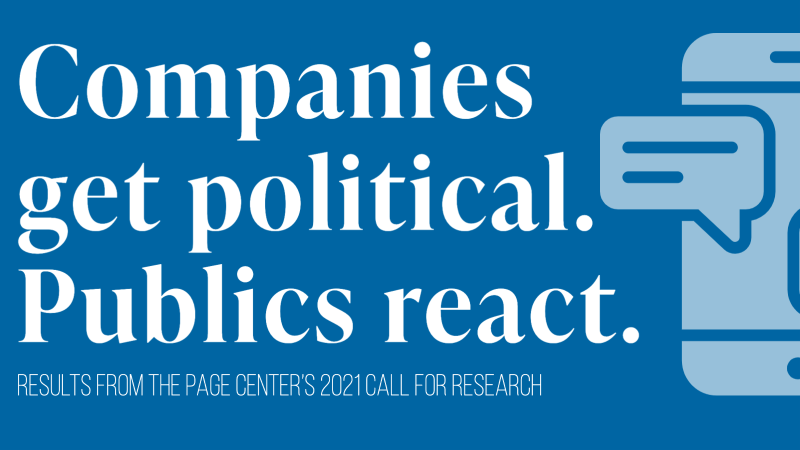Companies getting political and publics’ reactions to CSA
July 6, 2023

By Hao Xu, University of Melbourne, Australia; Jisu Huh and Hyejoon Rim, University of Minnesota – Twin Cities
Corporate social advocacy (CSA) has received growing attention in recent years, given the polarized political environment and publics’ expectations on companies as active societal members.
In CSA, the extent to which publics perceive a company’s stance to be consistent with or opposite to their own stances and value is likely to influence publics’ attitudes and perceptions regarding the involved company. As many of the socio-political issues are divisive, CSA initiatives tend to attract certain stakeholder groups but potentially alienate other groups simultaneously.
In this project, we devised an innovative computational research approach by developing a new natural language processing (NLP) algorithm to measure individuals’ political ideologies by analyzing their social media data. This allowed us to perform a naturalistic examination of the influence of public-company identity congruence on publics’ attitude toward the company engaged in CSA.
Specifically, focusing on six real-world CSA events that occurred around different socio-political issues in the past three years, we cross-analyzed:
1. The involved companies’ stances expressed in their CSA initiatives, determined based on the news coverage of these initiatives.
2. Sentiment scores of Twitter users’ conversations about the CSA initiatives, which captured publics’ attitude toward the involved companies.
3. Twitter users’ profile information and historical tweets data to infer the ideological identities of individuals who talked about the selected CSA initiatives.
A total of 5,181 individuals on Twitter were analyzed in our project.
Politically charged CSA initiatives
A clear pattern emerged from our computational analysis. Across the six analyzed CSA events, individual Twitter users’ attitudes toward the involved companies were more favorable when the companies’ communicated identities were congruent with their ideological identities than when they were incongruent with their ideological identities.
This supports the premise that CSA is inherently political. In CSA, companies make the political aspect of their corporate identities salient by taking explicit stances. Positive CSA outcomes are likely to be generated only among subsets of the public who share the same ideological identities with the companies, but these stances are likely to be perceived negatively by other subsets of the public.
We also found that individuals with stronger ideological identities tend to favor and support their own ideological groups and respond more negatively to opposing ideological groups than those with weaker ideological attachments.
Hence, it becomes crucial for researchers studying CSA to devote more attention to the nature of the social issues being advocated for in CSA and the evolving socio-political contexts. As these factors bring growing complexity to the relationships between companies and the public, we believe a more granular understanding of different segments of the public in CSA is necessary.
Computational methods as a promising approach in studying CSA
Our computational analysis demonstrates the feasibility of utilizing social media data and computational methods to examine CSA outcomes and influencing factors.
CSA initiatives create fluid and dynamic communication contexts. The development of computational methods brings unique contributions to CSA research by providing researchers with a powerful tool to assess public reactions at scale and in a timely manner, all within a naturalistic setting. As our project demonstrates, this approach complements the traditional social science research methods used in CSA research. It holds promise in enhancing our understanding of the impact and perception of CSA initiatives.
We believe integrating social media data and computational methods offers an exciting avenue for researchers to explore CSA outcomes and influencing factors. With continued advancements in technology and the increasing availability of social media data, the potential for computational analysis in public relations research is promising.
This research was funded by a 2021 Page/Johnson Legacy Scholar Grant from a call for proposals on corporate social advocacy.

